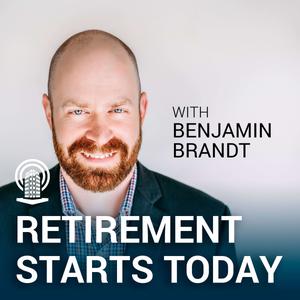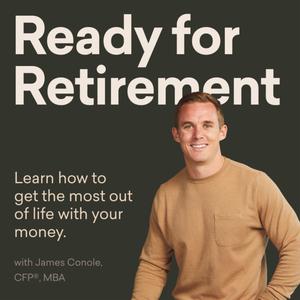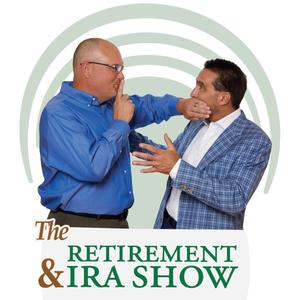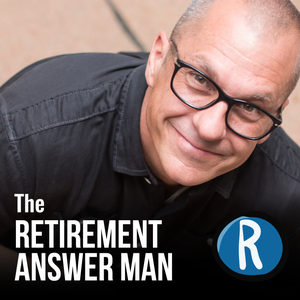
Retirement Starts Today
Benjamin Brandt CFP®, RICP®
- 22 minutes 39 secondsPeter Lazaroff’s Options for Reducing Taxes on Deferred Gains Pre-Retirement, Ep #385
Click here to work with us!
What if you could turn those green numbers in your investment account into retirement income while paying as little in taxes as possible? That’s exactly what we’re covering today with Peter Lazaroff, Chief Investment Officer at PlanCorp. We’re tackling the challenge many of us face: managing deferred gains in our portfolios and figuring out the smartest ways to reduce the tax hit as we transition to retirement.
Peter and I talk through a range of strategies for handling concentrated stock positions, whether it’s selling off winners gradually, taking advantage of tax-loss harvesting, or exploring more advanced options like exchange funds or a 351 exchange. These aren’t just dry financial concepts—they’re real, actionable ideas that can help you simplify your portfolio and make the most of what you’ve saved. And trust me, simplifying your financial “closet” can feel like a huge weight lifted.
We also talk about the emotional side of investing. Why does it feel so hard to part with stocks that have been good to us? Whether it’s an attachment to the company or pride in your early picks, Peter shares why these feelings matter and how to move past them to make decisions that better serve your long-term goals. Stick around—you won’t want to miss the insights he has to share.
Outline of This Episode- (0:20) Peter Lazaroff’s Options for Reducing Taxes on Deferred Gains Pre-Retirement
- (01:46) Why retirees need to manage large brokerage gains.
- (03:10) The emotional challenge of selling winning stocks.
- (05:20) Risks of concentrated stock positions and diversification.
- (09:00) Tax-loss harvesting and direct indexing strategies.
- (14:30) Simplifying portfolios with the 351 exchange.
- (18:40) Portfolio simplicity and enjoying retirement income.
- The Retirement Podcast Network
- Peter Lazaroff’s Book: "Making Money Simple" – www.peterlazaroff.com/freebook
- Peter Lazaroff’s Website – peterlazaroff.com
- The Long Term Investor Podcast – thelongterminvestor.com
- Become a Client: www.retirementstartstoday.com/start
- Get the Retire-Ready Toolkit: http://retirementstartstodayradio.com/
- Follow Ben on Twitter: https://twitter.com/retiremeasap
- Join the newsletter: https://retirementstartstodayradio.com/newsletter
- Dive deeper into retirement planning with Ben at www.RetirementIncome.University
Subscribe to Retirement Starts Today on
Apple Podcasts, Stitcher, TuneIn, Podbean, Player FM, iHeart, or Spotify
27 January 2025, 9:00 am - 22 minutes 40 secondsFired After Announcing Retirement? Ep # 384
Click here to work with us!
Can you be fired after announcing your retirement? It's a question that raises eyebrows and stirs concern for anyone nearing the end of their career. A recent article highlights the legal and financial implications of being terminated after sharing retirement plans, and it’s a scenario more common than you might think.
Employers often operate under at-will employment laws, giving them broad rights to terminate employees, even after a retirement announcement. But what does that mean for you? Understanding protections like ERISA and the Age Discrimination in Employment Act can make all the difference in navigating this tricky situation. It's not just about legalities—financial stability, severance packages, and health insurance come into play too.
On top of that, announcing retirement at the wrong time could mean missing out on potential benefits or buyouts. Striking a balance between professional courtesy and protecting your financial future is essential. When it comes to planning for life after work, the timing and approach of your announcement could impact everything from your wallet to your peace of mind.
Outline of This Episode- (0:00) Introduction
- (0:29) Yahoo Finance article discussion
- (1:11) At-will employment laws explained
- (2:08) Legal considerations: ERISA and age discrimination
- (3:57) Financial steps after unexpected termination
- (7:47) Protective measures to stay on track
- (10:05) Client story: Announcing retirement too early
- (12:12) Listener questions: What to retire to
- (13:04) Crafting a fulfilling retirement plan
- (17:27) Taking small risks to find post-career purpose
- The Retirement Podcast Network
- Yahoo Finance Article by Christy Bieber – Discussing legal and financial challenges of being fired after announcing retirement
- Freedom for Fido – A charity building shelters and fences for dogs in need
- Become a Client: www.retirementstartstoday.com/start
- Get the Retire-Ready Toolkit: http://retirementstartstodayradio.com/
- Follow Ben on Twitter: https://twitter.com/retiremeasap
- Join the newsletter: https://retirementstartstodayradio.com/newsletter
- Dive deeper into retirement planning with Ben at www.RetirementIncome.University
Subscribe to Retirement Starts Today on
Apple Podcasts, Stitcher, TuneIn, Podbean, Player FM, iHeart, or Spotify
20 January 2025, 9:00 am - 19 minutes 56 secondsHow to Spend More (or Less) in Retirement
Click here to work with us!
Are you spending too little in retirement, worried you might outlive your savings? Many retirees struggle to strike the right balance, often holding back on enjoying the wealth they’ve worked a lifetime to build. I’ll show you how to overcome those fears and spend with confidence while still planning for the future.
What about real estate? Whether you’re thinking about renting instead of owning, leveraging home equity for long-term care, or even investing in rental properties, the right approach can make all the difference. I’ll share practical insights to help you figure out what works best for your lifestyle and financial independence.
Retirement is your chance to live on your terms, free of unnecessary stress and worry. By understanding the psychology of spending and making thoughtful decisions about your biggest assets, you can enjoy the freedom and security you’ve earned. Let’s get started.
Outline of This Episode- [0:00] The Start of 2025
- [1:50] Spending Struggles in Retirement
- [4:40] Connecting with Your Future Self
- [6:12] Underspending Biases and Longevity Risk
- [12:01] Real Estate in Retirement
- [14:10] Renting vs. Owning
- [16:10] Home Equity for Long-Term Care
- The Retirement Podcast Network
- Morningstar Article: Tips to spend less or more in retirement by Samantha Lamas.
- Benjamin Brandt’s Book: Retirement Starts Today.
- Capital City Wealth Management: Benjamin Brandt’s financial planning firm.
- Become a Client: www.retirementstartstoday.com/start
- Get the Retire-Ready Toolkit: http://retirementstartstodayradio.com/
- Follow Ben on Twitter: https://twitter.com/retiremeasap
- Join the newsletter: https://retirementstartstodayradio.com/newsletter
- Dive deeper into retirement planning with Ben at www.RetirementIncome.University
Subscribe to Retirement Starts Today on
Apple Podcasts, Stitcher, TuneIn, Podbean, Player FM, iHeart, or Spotify
13 January 2025, 9:00 am - 19 minutes 59 secondsPurpose vs purpose: An interview with Doc G, Ep #382
What does it mean to live a life of purpose? I talk with Jordan Grumet, aka Doc G, host of the Earn & Invest podcast, about how his work as a hospice doctor shaped his understanding of purpose and regret. His new book, “The Purpose Code,” offers insights on how to live with intention and meaning.
We talk about the difference between "Big P" and "Little P" purpose and why focusing on grand goals often leads to frustration. Jordan shares how the terminally ill reflect on their lives, emphasizing the courage it takes to prioritize what truly matters.
This conversation is about using time, money, and energy to create a fulfilling life. Whether you’re planning retirement or redefining your goals, Jordan’s perspective can help you focus on what lights you up and brings you joy.
Outline of This Episode- [1:42] Purpose and Regret: Lessons from terminally ill patients
- [3:40] The Purpose Paradox: Tackling anxiety in finding purpose
- [5:50] The Role of Courage: Overcoming barriers to meaningful living
- [8:40] The Trap of “Enoughness”: When financial goals fall short
- [14:00] Winning Life: Filling your calendar with what matters
- [17:10] The Purpose Code: A guide to living intentionally
- The Retirement Podcast Network
- Book: The Purpose Code (Available January 7th, 2025)
- Podcast: Earn and Invest
- Book: Taking Stock: A Hospice Doctor’s Advice on Financial Independence, Building Wealth, and Living a Regret-Free Life
- Jordan Grumet’s Website: jordangrumet.com
- Become a Client: www.retirementstartstoday.com/start
- Get the Retire-Ready Toolkit: http://retirementstartstodayradio.com/
- Follow Ben on Twitter: https://twitter.com/retiremeasap
- Join the newsletter: https://retirementstartstodayradio.com/newsletter
- Dive deeper into retirement planning with Ben at www.RetirementIncome.University
Subscribe to Retirement Starts Today on
Apple Podcasts, Stitcher, TuneIn, Podbean, Player FM, iHeart, or Spotify
6 January 2025, 9:00 am - 23 minutes 24 seconds5 Expenses Retirees Wish They Spent More Money On (Rebroadcast)
Originally aired February 2024:
There are two ways to mess up retirement: run out of money or die with regret. Oftentimes, people in the retirement space only focus on the running out of money part.
In an effort to help you live an even better retirement, today’s retirement headline discusses the regret part. Join me to learn five expenses that retirees wish they had spent more money on so that you can learn from their mistakes.
Stick around to hear the answer to our listener question: Is there one person who can help develop a comprehensive retirement plan? Or do you need to have an investment advisor, a financial advisor, a tax advisor, and an estate planning attorney? Find out the answer by pressing play.
For more information, visit the show notes at https://retirementstartstodayradio.com/5-expenses-retirees-wish-they-spent-more-money-on-rebroadcast
30 December 2024, 9:00 am - 21 minutes 31 seconds8 Ways to Become Poor in Retirement (Rebroadcast)
Originally aired March 2024:
There are many ways that could threaten your financial security in retirement. Knowing the common issues can ensure that you don’t fall into the traps.
Today’s financial headline comes from Yahoo Finance and is called 8 Ways Baby Boomers Become Poor in Retirement. Listen in to learn what they are so that you don’t drive yourself into the poorhouse.
For more information, visit the show notes at https://retirementstartstodayradio.com/8-ways-to-become-poor-in-retirement-rebroadcast
23 December 2024, 9:00 am - 20 minutes 13 secondsThe 4 Phases of Retirement (Rebroadcast)
Originally aired April 2024:
It may be easy to define success in your working career, but defining success in retirement can be more difficult. What does success look like in retirement? What will you do daily or weekly to get the most out of your retirement?
In this episode of Retirement Starts Today, we’ll explore a TEDx talk about the 4 phases of retirement that many (but not all) experience. Click play to hear how you can squeeze the most juice out of your retirement.
For more information, visit the show notes at https://retirementstartstodayradio.com/the-4-phases-of-retirement-rebroadcast
16 December 2024, 9:00 am - 23 minutes 11 secondsUsing Guardrails For The 4% Rule [Rebroadcast]
Originally aired February 2024:
You’ve heard of the 4% rule, and if you’ve listened to this podcast before, you’ve heard of Guyton’s guardrails strategy. But have you ever heard of using them together? Today’s retirement headline explores this idea.
Overall, the article highlights the importance of considering sequence-of-returns risk in retirement planning and adopting flexible strategies, such as guardrails, to ensure financial security throughout retirement.
Listen in to learn more about this combination of strategies as well as my opinion on the matter. Then stick around for the listener question segment where Bret and I answer the question: Do I need a will if I want to split my assets evenly between my two children?
Outline of This Episode
(02:11) Sequence of returns risk is the greatest risk to your retirement (14:49) Should I have a will to split my assets evenly between my kids?
For more information, visit the show notes at https://retirementstartstodayradio.com/using-guardrails-for-the-4-rule-rebroadcast
Connect with Benjamin Brandt- Get the Retire-Ready Toolkit: http://retirementstartstodayradio.com
- Follow Ben on Twitter: https://twitter.com/retiremeasap
- Subscribe to the newsletter: https://retirementstartstodayradio.com/newsletter
Pre-order Benjamin's book by January 7, 2025:Retirement Starts Today: Your Non-financial Guide to an Even Better Retirement
Subscribe to Retirement Starts Today onApple Podcasts, Spotify, Pocket Casts, TuneIn, Podbean, Player FM, or iHeart
9 December 2024, 9:00 am - 22 minutes 16 secondsIs the 4% Rule Too Safe? [Rebroadcast]
Originally aired June 2024:
The 4% rule is the “golden rule” of retirement planning. Everyone is familiar with it and it’s easy to work out for some quick, back-of-the-napkin math.
Since it is so easy to calculate and implement, many use it as their retirement withdrawal rule. However, this approach may be overly conservative. While using a significantly higher withdrawal rate may go too far, the 4% rule may be too cautious.
Listen in to hear the limitations of sticking with this overly simplistic rule of thumb.
Outline of This Episode- (2:25) Is the 4% rule too safe?
- (11:16) Does it make sense to spend more in the early years while awaiting full retirement age?
Oftentimes, people fail to take into account other income sources when calculating the 4% rule. Social Security and pensions may provide a base income floor which means you could use a higher withdrawal rate from your portfolio.
My biggest problem with the rigid 4% rule is that it isn’t flexible enough. The 4% rule doesn’t allow for spending flexibility and ignores spending adjustments that could be made on actual needs and circumstances.
Another reason to avoid this stringent rule is that it doesn’t fully evaluate outcomes. The probability of success should be viewed as a spectrum. This approach will help measure the total amount of the goal achieved each year providing a more nuanced understanding of retirement readiness.
What to do instead of relying on the 4% ruleIncorporating more realistic metrics, such as goal completion and spending flexibility can lead to higher optimal spending levels. Based on this updated perspective, a 5% withdrawal rate may be more appropriate for the average retiree over a 30-year retirement period.
However, the ideal rate depends on various factors, including the retiree’s specific circumstances and goals.
Recent research introduces guided spending rates, where the withdrawal rate adjusts based on an individual’s flexibility and retirement duration, ranging from 10 to 40 years. Increasing the withdrawal rate from 4% to 5% may seem modest, but it represents a 25% increase in potential income, offering retirees more discretionary funds earlier in retirement when they are more active.
Finding the right withdrawal rate is about balancing safety and practicality. A more dynamic approach that reflects individual circumstances and the ability to adjust spending is essential for effective retirement planning.
In conclusionThe 4% rule is a great rule of thumb based on a worst-case scenario, however, it isn’t comprehensive enough to create a fully-fledged retirement plan.
Your retirement income plan needs to be adjusted based on your spending level, market performance, and inflation. To simply set your income source one day at the beginning of retirement and never look back is a foolhardy endeavor. There is no way that you could accurately plan the next 30 years of your life. Flexibility is key for planning your spending in retirement.
Resource Mentioned Connect with Benjamin Brandt- Get the Retire-Ready Toolkit: http://retirementstartstodayradio.com
- Follow Ben on Twitter: https://twitter.com/retiremeasap
- Subscribe to the newsletter: https://retirementstartstodayradio.com/newsletter
Pre-order Benjamin's book by January 7, 2025:Retirement Starts Today: Your Non-financial Guide to an Even Better Retirement
Subscribe to Retirement Starts Today onApple Podcasts, Spotify, Pocket Casts, TuneIn, Podbean, Player FM, or iHeart
2 December 2024, 8:00 am - 21 minutes 18 secondsThe Four Unique Risks in Decumulation [Rebroadcast]
You’ve been accumulating your savings your entire life, but when the time comes to draw down your investments, there are new risks. In this episode, we’ll discuss four risks that come with the decumulation phase of retirement.
Press play to learn how to avoid these risks in retirement.
Are you looking for a new advisor? One of our listeners is looking for a checklist to help him hire a retirement advisor. While answering that question I went ahead and made my advisor checklist available to all of you to download here.
Outline of This Episode
[1:47] Understand effective strategies for the decumulation phase [11:20] Do I have a checklist to use to hire a retirement advisor?
Resources Mentioned
Connect with Benjamin Brandt- Get the Retire-Ready Toolkit: http://retirementstartstodayradio.com
- Follow Ben on Twitter: https://twitter.com/retiremeasap
- Subscribe to the newsletter: https://retirementstartstodayradio.com/newsletter
Pre-order Benjamin's book by January 7, 2025:Retirement Starts Today: Your Non-financial Guide to an Even Better Retirement
Subscribe to Retirement Starts Today onApple Podcasts, Spotify, Pocket Casts, TuneIn, Podbean, Player FM, or iHeart
25 November 2024, 9:00 am - 19 minutes 18 secondsNavigating the Complex World of Inherited Wealth with Myra Salzer, Ep #375
Ready to learn how to make a lasting and meaningful legacy for your loved ones? I had an in-depth conversation with Myra Salzer from the Wealth Conservancy. Myra brings a unique perspective as a financial advisor who specializes in helping clients navigate life after inheriting significant wealth. We explore not just the financial implications but the deeply personal challenges that can come with inheriting a fortune.
Myra shows us how inheritors are similar to retirees in that both are financially independent, yet they differ significantly in their experiences. Unlike retirees who have worked, saved, and planned, many inheritors have never experienced earning and managing money themselves. This usually leads to a lack of control over their finances, emotional challenges, and pretty complex social relationships.
We also get into the importance of transparency and avoiding surprises when planning an inheritance. Myra shares invaluable advice on how wealthholders can communicate with beneficiaries to build trust and strengthen relationships. For those of us planning to leave a financial legacy, this conversation is a must-listen to ensure that our wealth becomes a true blessing for future generations.
Outline of This Episode- [0:20] Meet Myra Salzer
- [1:18] Myra’s specialty
- [3:05] Inheritors’ limited control
- [4:48] Differences between inheritors and retirees
- [6:00] Social challenges where inheritors often struggle
- [8:20] Avoiding surprises in inheritance planning
- [14:00] The value of smaller, meaningful gifts
- Become a Client: www.retirementstartstoday.com/start
- Get the Retire-Ready Toolkit: http://retirementstartstodayradio.com/
- Follow Ben on Twitter: https://twitter.com/retiremeasap
- Join the newsletter: https://retirementstartstodayradio.com/newsletter
- Go deeper into retirement planning with Ben at www.RetirementIncome.University
Pre-order Benjamin's book by January 7th:Retirement Starts Today: Your Non-financial Guide to an Even Better Retirement
Subscribe to Retirement Starts Today onApple Podcasts, Spotify, Pocket Casts, TuneIn, Podbean, Player FM, or iHeart
18 November 2024, 9:00 am - More Episodes? Get the App
Your feedback is valuable to us. Should you encounter any bugs, glitches, lack of functionality or other problems, please email us on [email protected] or join Moon.FM Telegram Group where you can talk directly to the dev team who are happy to answer any queries.
 Big Picture Retirement
Big Picture Retirement
 Stay Wealthy Retirement Show
Stay Wealthy Retirement Show
 Ready For Retirement
Ready For Retirement
 Sound Retirement Radio
Sound Retirement Radio
 The Retirement and IRA Show
The Retirement and IRA Show
 Retirement Answer Man
Retirement Answer Man